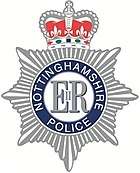Nottinghamshire Police
| Nottinghamshire Police | |
|---|---|
 | |
| Agency overview | |
| Formed | 1840 (Nottinghamshire Constabulary), 1968 (merger) |
| Jurisdictional structure | |
| Operations jurisdiction | Nottinghamshire, UK |
.svg.png) | |
| Map of Nottinghamshire Police's jurisdiction. | |
| Size | 2,160 |
| Population | 1,034,700 |
| Headquarters | Sherwood Lodge, Arnold, Nottingham |
|
| |
| Sworn members |
2,095 (of which 381 are Special Constables) [1] |
| Police and Crime Commissioner responsible | |
| Agency executive |
|
| Divisions | 2 |
| Facilities | |
| Stations | 31 |
| Website | |
| www.nottinghamshire.police.uk | |
Nottinghamshire Police is the territorial police force responsible for policing the shire county of Nottinghamshire and the unitary authority of Nottingham in the East Midlands of England. The area has a population of just over 1 million.
The force headquarters are found at Arnold. As of March 2013 the force had an establishment of 2,095 police officers, and 381 Special Constables. [2]
The Chief Constable is Craig Guildford who has held the position since February 2017.[3]
Nottinghamshire Police Authority was disbanded on 15 November 2012 when the first Police and Crime Commissioners were elected. Paddy Tipping was named as Nottinghamshire Police and Crime Commissioner on 16 November 2012.[4]
Police Area
The Police Area covers the ceremonial county of Nottinghamshire, which contains the following local authorities:
| Local Authority | Large towns/cities |
|---|---|
| Bassetlaw | Worksop, Retford |
| Mansfield | Mansfield |
| Newark and Sherwood | Newark-on-Trent |
| Ashfield | Sutton-in-Ashfield, Kirkby-in-Ashfield, Hucknall |
| Gedling | Arnold, Carlton |
| Broxtowe | Beeston, Stapleford, Eastwood, Kimberley |
| Nottingham | Nottingham |
| Rushcliffe | West Bridgford, Cotgrave, Keyworth |
Map showing Local Authorities within the Police Area.
History
Nottinghamshire Constabulary was established in 1840. The following year it absorbed Retford Borough Police. In 1947 it absorbed Newark-on-Trent Borough Police. In 1968 it amalgamated with Nottingham City Police to form Nottinghamshire Combined Constabulary.[5] On 1 April 1974 it was reconstituted as Nottinghamshire Police under the Local Government Act 1972, but retained the name Nottinghamshire Constabulary on all signage, uniform and vehicles until the early 21st century.
In 1965, Nottinghamshire Constabulary had an establishment of 1,026 officers and an actual strength of 798.[6]
Proposals made by the Home Secretary in March 2006 would have seen the force merge with the other four East Midlands forces to form a strategic police force for the entire region.[7] However, in July 2006 the proposed merger was cancelled.[8][9]
In June 2006, the force was declared effective and efficient by Her Majesty's Inspectorate of Constabulary (HMIC) after five years of intense scrutiny.[10]
In 2009, a performance assessment carried out by the government ranked the force's operational area as the third worst in the country.[11]
In March 2010, the HMIC rated the force as 'poor' in three reviewed areas of, 'Local Policing', 'Confidence' and 'Protecting from Harm'. Nottinghamshire Police were the only force in England & Wales to receive such a rating. Although the HMIC did not attempt to place the 43 police forces in England & Wales in a directly comparable league table (due to difficulties in comparing a large city force with a small rural force), Nottinghamshire Police did give the HMIC cause for concern. The media portrayed the analysis as showing the force as the 'worst in England & Wales'.[12]
List of Chief Constables
Chief Constables were: [13]
- Nottingham Constabulary
- 1814–1833 Richard Birth
- 1833–? William Barnes
- 1852–1856 Captain John Henry Forrest [14] (afterwards Chief Constable of Hampshire)
- ???
- 1860-1865 Joseph Hedington
- 1865-1869 John Freeman (former Chief Constable of Plymouth)
- 1869-1872 Captain F. Parry
- 1872-1881 Major William Henry Poyntz (appointed Chief Constable of Essex)
- 1881-1892 Samuel Stevens (former Chief Constable of Rochdale)
- 1892-1912 Phillip Stephen Clay (former Chief Constable of Southampton)
- 1912-1930 Lt. Col. F. Lemon
- 1930-1959 Captain Athelstan Popkess
- 1960-1968 Thomas Moore
- 1968 Nottingham Constabulary merged with Nottinghamshire Constabulary
- Nottinghamshire Constabulary
- 1856–1892 Captain Henry Holden
- 1892–1922 Captain Sir William Hugh Tomasson [15]
- ???
- 1949–1970 John Edward Stevenson Browne
- 1970-1976 Rex Fletcher
- 1976-1987 Charles McLachlan
- 1987-1990 Sir Ronald Hadfield (Knighted in 1995 Birthday Honours)
- 1990-1995 Sir Dan Crompton
- 1995-2000 Colin Bailey
- 2000-2008 Steven Green
- 2008-2012 Julia Hodson
- 2012-2016 Chris Eyre
- 2016-2017 Susannah Fish (Acting Chief Constable )
- 2017– Craig Guildford
Divisional structure
The force used to be split into four divisions;
- A Division - Mansfield & Ashfield
- B Division - Bassetlaw, Newark and Sherwood
- C Division - Nottingham City
- D Division - South Nottinghamshire (covers the local government boroughs of Broxtowe, Gedling, and Rushcliffe).
As of April 2011 the force was re-structured to the following divisions;
- Central Division (City of Nottingham) This was then split into two more, City North & City South
- County North (Mansfield, Ashfield, Bassetlaw)
- County South (Broxtowe Borough, Gedling, Rushcliffe, Newark & Sherwood)
In 2016 the force moved from a geographic divisional management structure to a thematic model.[16] Police functions being managed across the county based on their function rather than the area they cover. Each of the two areas are headed by a Chief Superintendent. The two thematic areas are;
- Uniformed Operations
- Intelligence and Investigations
Custody suites
There are 3 custody suites across the force: Bridewell (71 cells), Mansfield (32 cells) and Newark-on-Trent(10 cells)[17][18] but there are currently plans under review to close the Newark-on-Trent suite as a cost-saving measure[19].
Response policing is provided across the county from 12 Response Hubs, reduced from 23 under the old geographic model. There are plans to reduce this number to 9 in the future.[20]
Nottinghamshire is also divided into a number of Neighbourhood Policing Areas, each of which is headed by a Neighbourhood Policing Inspector. These provide local neighbourhood policing and are staffed by teams of Police Officers, PCSO's and Special Constables.
The Intelligence and Investigations Command covers areas including Intelligence, Public Protection, Integrated Offender Management and CID.
Operational Support Policing for the force between 2015 and May 2018 was provided by the East Midlands Operational Support Service (EMOpSS), a multi force alliance which provides Roads Policing, Police Dogs, Armed Response and other specialist services over Nottinghamshire, Leicestershire, Lincolnshire and Northamptonshire.[21] In May 2018 Operational Support Policing withdrew from the regional collaboration and a new department was established. The newly formed Operational Support department is led by Superintendent Steve Cartwright. Supt Cartwright is a Strategic Firearms Commander and Public Order Silver Commander. He is the force lead for Football Policing and Public Order.
Air Support for the force is provided by the National Police Air Service who closed the former Nottinghamshire/Derbyshire Air Support Unit at Ripley in early 2015. Cover is now provided from further afield using the nearest available aircraft. This function was previously supplied to the force by a joint venture with Derbyshire Police, the North Midlands Helicopter Support Unit.
Notable officers
- Sarah Davies, former member of girl band Hepburn[22]
- Christopher Dean, ice-skater
- Geoffrey Dear, Baron Dear
- Paul Easter, Scottish Olympic swimmer
- Steve Ogrizovic, Professional Footballer
- David Hyndman, Author History of Nottingham City Police 2 x Pictorial Books
Officers killed in the line of duty
The Police Memorial Trust lists and commemorates all British police officers killed in the line of duty, and since its establishment in 1984 has erected over 38 memorials to some of those officers.
The following officers of Nottinghamshire Police are listed by the Trust as having died attempting to prevent, stop or solve a crime, since the turn of the 20th century:[23]
- Sgt Ernest Crowston, 1921 (fatally injured attempting to stop a speeding vehicle)
- PC Raymond Free, 1950 (collapsed after attending a domestic disturbance)
- PC Stephen Atkinson 1977 (Fatally injured in an accident when hit by a car while on point duty)
- PC Christopher John MacDonald, 1978 (beaten and drowned by burglar)
- PC Gerald Walker, 2003 (fatally injured when dragged by a stolen vehicle)
See also
Footnotes
- ↑ "Tables for 'Police workforce, England and Wales, 31 March 2013". HM Government. Office for National Statistics. 31 March 2013. Retrieved 29 May 2014.
- ↑ "Tables for 'Police workforce, England and Wales, 31 March 2013". HM Government. Office for National Statistics. 31 March 2013. Retrieved 29 May 2014.
- ↑ "Chief Officer Team". Nottinghamshire Police. Retrieved 23 April 2017.
- ↑ "Nottinghamshire PCC". Nottinghamshire Police and Crime Commissioner. Retrieved 16 February 2013.
- ↑ "History". Nottinghamshire Police. Archived from the original on 7 December 2010. Retrieved 12 February 2011.
- ↑ The Thin Blue Line, Police Council for Great Britain Staff Side Claim for Undermanning Supplements, 1965
- ↑ "Police forces 'to be cut to 24". BBC News. BBC. 20 March 2006. Retrieved 12 February 2011.
- ↑ "Confusion over police merger plan". BBC News. BBC. 13 July 2006. Retrieved 12 February 2011.
- ↑ "Police bill government on mergers". BBC News. BBC. 21 July 2006. Retrieved 12 February 2011.
- ↑ "Positive result for police force". BBC News. BBC. 28 June 2006. Retrieved 12 February 2011.
- ↑ Fletcher, S. (16 July 2009). "Notts is third worst county for crime". Nottingham Post. Retrieved 12 February 2011.
- ↑ Langford, Mark (11 March 2010). "Revealed: The Worst Police In The Country". Sky News Online. BSkyB. Retrieved 12 February 2011.
- ↑ "Our History". Nottinghamshire Police. Retrieved 16 June 2018.
- ↑ "Captain John Henry Forrest". Hampshire Constabulary. Retrieved 16 June 2018.
- ↑ "History of Woodthorpe House". Sherwood Community Center. Retrieved 16 June 2018.
- ↑ "About Us | Nottinghamshire Police". Retrieved 20 May 2017.
- ↑ "Response to Request under Freedom of Information Act 2000 000125/17" (PDF). Nottinghamshire Police. 9 January 2017. Retrieved 8 February 2018.
- ↑ "Response to Request Under the Freedom of Information Act 2000 002503/17". What Do They Know. 8 May 2017. Retrieved 8 February 2018.
- ↑ Jarram, Matt (26 September 2017). "Newark police custody suite could close to pay for extra officers". The Nottingham Post. Retrieved 8 February 2017.
- ↑ "Partnership Briefing" (PDF). Retrieved 20 May 2015.
- ↑ "East Midlands Operational Support Service (EMOpSS)". www.lincs.police.uk. Retrieved 20 May 2017.
- ↑ "Top of the Beat Bobbies". BBC Nottingham. 15 April 2008. Retrieved 3 April 2011.
- ↑ http://www.policememorial.org.uk/Forces/Nottinghamshire/Nottinghamshire_Roll.htm
